Population growth was included within the development plan of the country. The nation had a serious responsibility to make sure its people had food, housing, and education.
On the Correct Handling of Contradictions Among the People
In 1957, Mao wavered. He said, “it would be great if we could lower the birth rate a bit. We need planned births. Humanity… has plans for industrial production, but it does not have plans for the production of humans.”
This spurred Beijing University economist Ma Yinchu to write an article titled New Population Theory which attempted to fuse Marxism and Malthusianism. The Anti-Rightist response, which included over 200 published denouncements and his firing from the University, led to Mao backtracking.
A year later, he said ”for now, a large population is better,” adding “I said that we could manage with 800 million. I think that one billion plus would be no cause for alarm.” Population control remained a “forbidden zone” until the early 1970s.
Rockefeller & Kissinger Pressure Mao to make a Grand Bargain
In 1973, David Rockefeller visited Mao to discuss the opening up of the country’s economy. His family’s foundation had spent sixty years funding birth control studies in China, as John D. Rockefeller III once said population as an “outstanding problem” for the country. Within two weeks, China established the Family Planning Leadership Group.
The Rockefeller visit was followed closely by the publication of Henry Kisssinger’s loathsome NSSM-200: Implications of Worldwide Population Growth for U.S. Security and Overseas Interests report. It stated that “allocation of scarce resources should take account of what steps a country is taking in population control. There is an alternative view that mandatory programs may be needed.”
Judging from declassified White House briefings, Kissinger and Mao had a clear understanding about Western expectations for China‘s population “problem.”
In 1974, China‘s delegation to United Nations Population Conference issued one final public challenge to the Malthusian narratives:
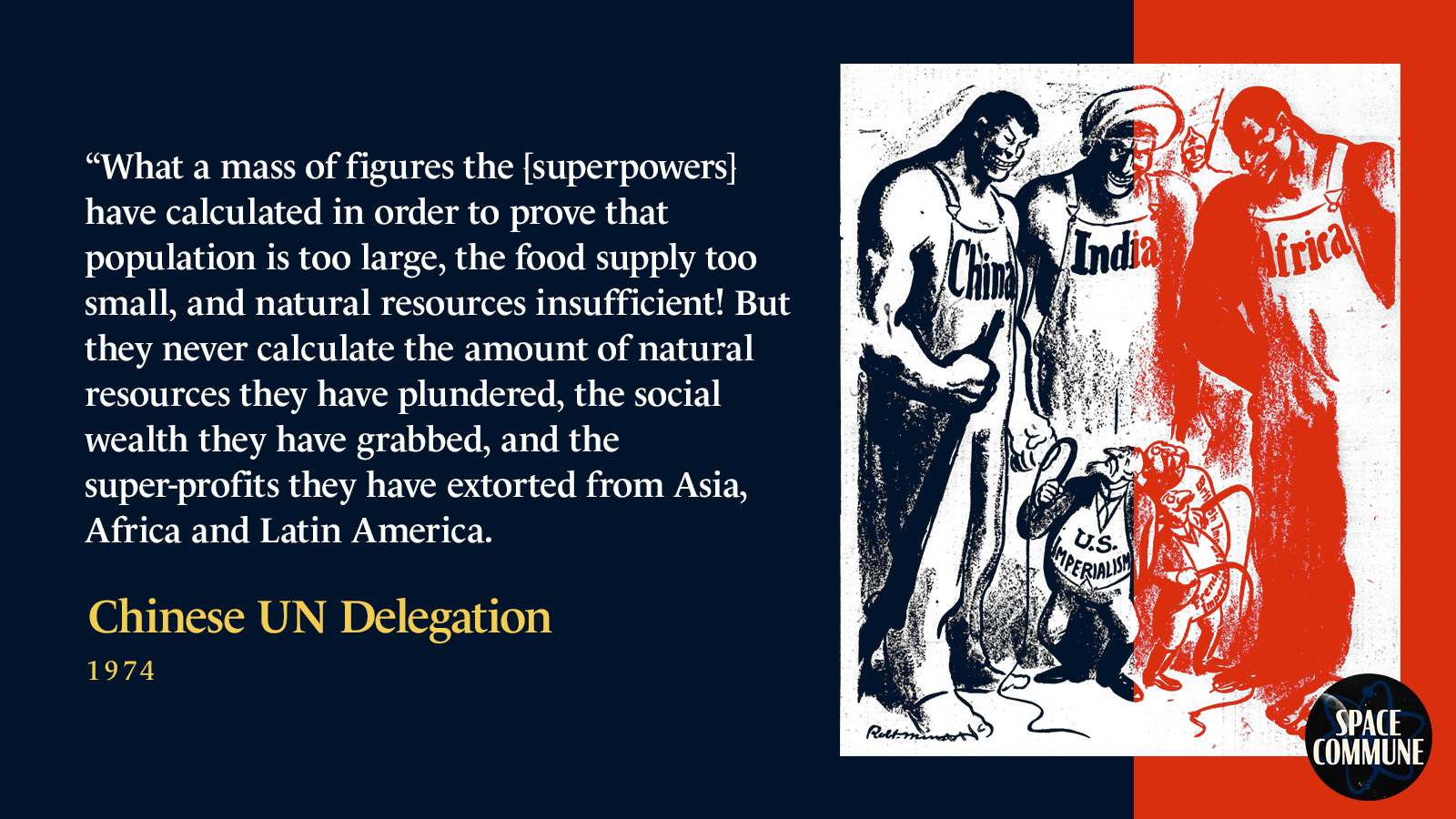
Is it owing to overpopulation that unemployment and poverty exist in many countries of the world today? No, absolutely not. It is mainly due to aggression, plunder and exploitation by the imperialists, particularly the superpowers. . . . What a mass of figures they have calculated in order to prove that population is too large, the food supply too small and natural resources insufficient!
But they never calculate the amount of natural resources they have plundered, the social wealth they have grabbed and the superprofits they have extorted from Asia, Africa and Latin America. If an account were made of their exploitation, the truth with regard to population problems would at once be out. Their multitude of population statistics will not help them a bit either.
The statement was essentially the last outward-facing dissent to population control being forced upon China; from this point forth, the country had to control its population in order to access the capital it needed to modernize and revolutionize its productive forces.
In 1978, after Mao‘s death, Deng Xiaoping met with the U.N. Fund for Population Activities, which was mainly funded by the United States. A result of the meeting was that the UNFPA awarded $177M to China over the next 20 years.
In a cruel twist of fate, in the 1980s, conservative anti-abortion politicians in the United States raised alarms about the One Child Policy’s allegedly coercive practices, and threatened to pull UNFPA funding from China. Wittingly or unwittingly, they were protesting policies that the US government itself had nudged China to adopt.
The Club of Rome Invades China with the Limits to Growth
The case for population control was clear. If China could show progress to Western governments, Kissinger, and oligarchs like the Rockefellers, they would have access to foreign investment. They would be allowed to develop relatively unfettered than if they defied the West.
The only thing missing was a convincing population control argument that party members and officials could buy into. After all, they remembered what happened to people who made Malthusian suggestions in the past.
Deng encouraged defense scientists to turn their attention to China’s development problems. A missile scientist named Song Jian, who had no expertise in economics or population research, became a key figure in developing what is now known as the One Child Policy.
The big break was in 1979, when Song traveled to Helsinki for the Seventh Triennial World Congress of the International Federation of Automatic Control. There, he first encountered cybernetic-based, Limits to Growth-inspired methods of population control being proposed by Dutch scientists.
From then on, Song’s team was guided by techniques and logic extrapolated from the writings of the Club of Rome.
The historical context of that time is critical. At the time, books like The Population Bomb, Small is Beautiful, Silent Spring, and and the Limits to Growth report were considered in the West to be cutting-edge. To an outside observer, it was clear that every serious world power was deeply concerned with overpopulation, and that scientists had a mandate to come up with real solutions.

Song wrote in 1986:
After more than ten years of isolation from the outside world, during a visit to Europe of 1978, I happened to learn about the application of systems analysis theory… to the study of population problems. For instance, in a “Blueprint for Survival” published in 1972, British scientists contended that Britain’s population of 56 million had greatly exceeded the sustaining capacity of the ecosystem of the Kingdom. They argued that Britain’s population should be gradually reduced to 30 million, namely, a reduction by nearly 50 percent. Some Dutch scientists also believed that the Netherlands population of 13.5 million had far gone beyond the limit of what the country’s 40,000 square kilometery territory could possibly bear and should therefore be reduced by at least half. I was extremely excited about these documents and determined to try the method of demography.
Sadly for China, Song didn’t encounter any of the thorough critiques of the Limits to Growth‘s flawed computer modeling or underlying assumptions about innovation, resourcefulness and growth. As figures like Julian Simon and Lyndon Larouche most eloquently argued at the time, the Limits to Growth discounted our greatest resource: the ability of human beings to engineer solutions, like the Green Revolution for agriculture, or nuclear energy for electricity, to humanity’s problems.
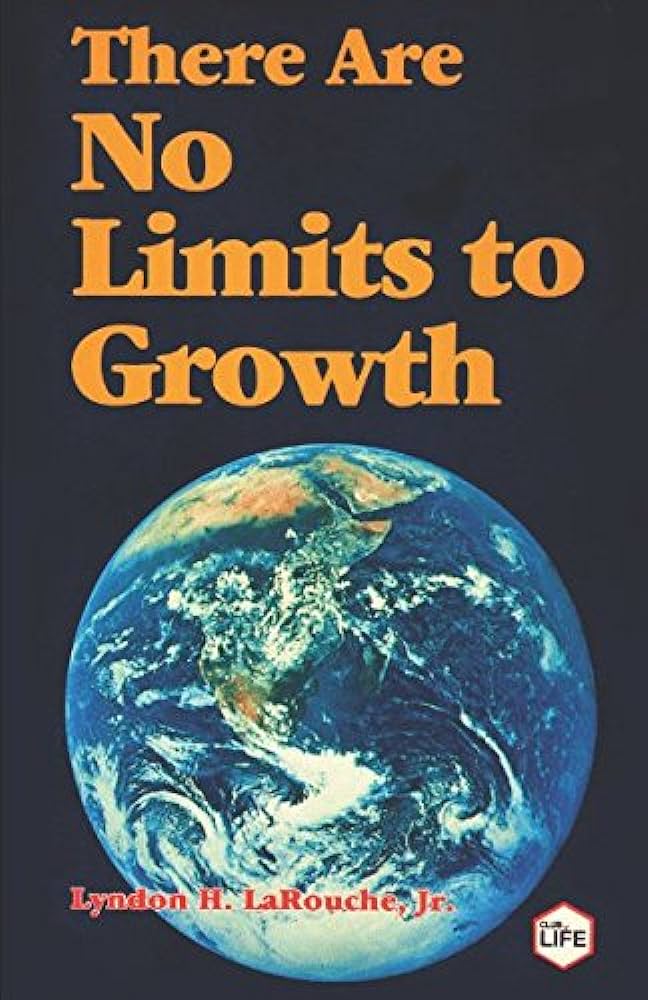
Song returned to work in China and urgently began reading Malthus and Western demographers to replicate Club of Rome’s projections specifically for China, while cleaning them up to seem scientifically-based and socialist. The next year, the Politburo issued a letter to party members urging them to only have one child.
A Bad Idea That Should be Blamed on Western Imperialism; Not Totalitarianism
The policy encountered stiff resistance from Chinese citizens, especially in rural areas.
While only about 35% of the population had the policy applied to them, the overall moves toward discouraging reproduction resulted in China’s population growth rate decreasing from 2.3% in 1973 to 0.1% in 2021. Song failed to create “modernization with Chinese characteristics,” as Deng had requested, as his work was entirely Western-derived in nature, creating a one-sided fiction that China’s population was primarily preventing it from being a rich, powerful country.
The most critical flaw in Song’s work was that while his Western contemporaries treated population control as a scientific exercise, in China, it was treated as a concrete policy proposal that was needed to transform the country from a poor, backwards country into a world power.
England and the Netherlands never actually reduced their populations by 45% and 63%, despite what papers Song read at the 1979 conference. The One Child Policy, which had deep repercussions for China‘s population dynamics, can clearly be traced back to imperialist pressures and ideologies.
Figures such as Kissinger and Rockefeller effectively signaled to Chinese leaders that population control was a prerequisite for accessing essential Western capital. In a desperate bid to translate this pressure into actionable policy, Song Jian turned to Malthusian concepts, ultimately culminating in a policy that heaped immense costs upon the Chinese people.
As historian Susan Greenhalgh noted, “Western ideas… shape[d] China‘s population policy.”
Today, as China grapples with the challenges of an aging population, we must critically evaluate the influence of current Western environmental ideologies, particularly those promoted by the modern Club of Rome, on China‘s future trajectory.
Evidence is in the video below. Jorgen Rangers, one of the original authors of the Limits to Growth report, is now the Head of the Centre for the Ecological Civilization at Peking University and a key figure with the China Association for the Club of Rome. He appeared on CGTN to discuss how China needs to degrow its economy:
Meanwhile, Monthly Review, one of the leading Fabian Marxist journals, recently published an entire issue of their magazine devoted to the topic of degrowth. A frontpage story: “Degrowing China – By Collapse, Redistribution, or Planning?”
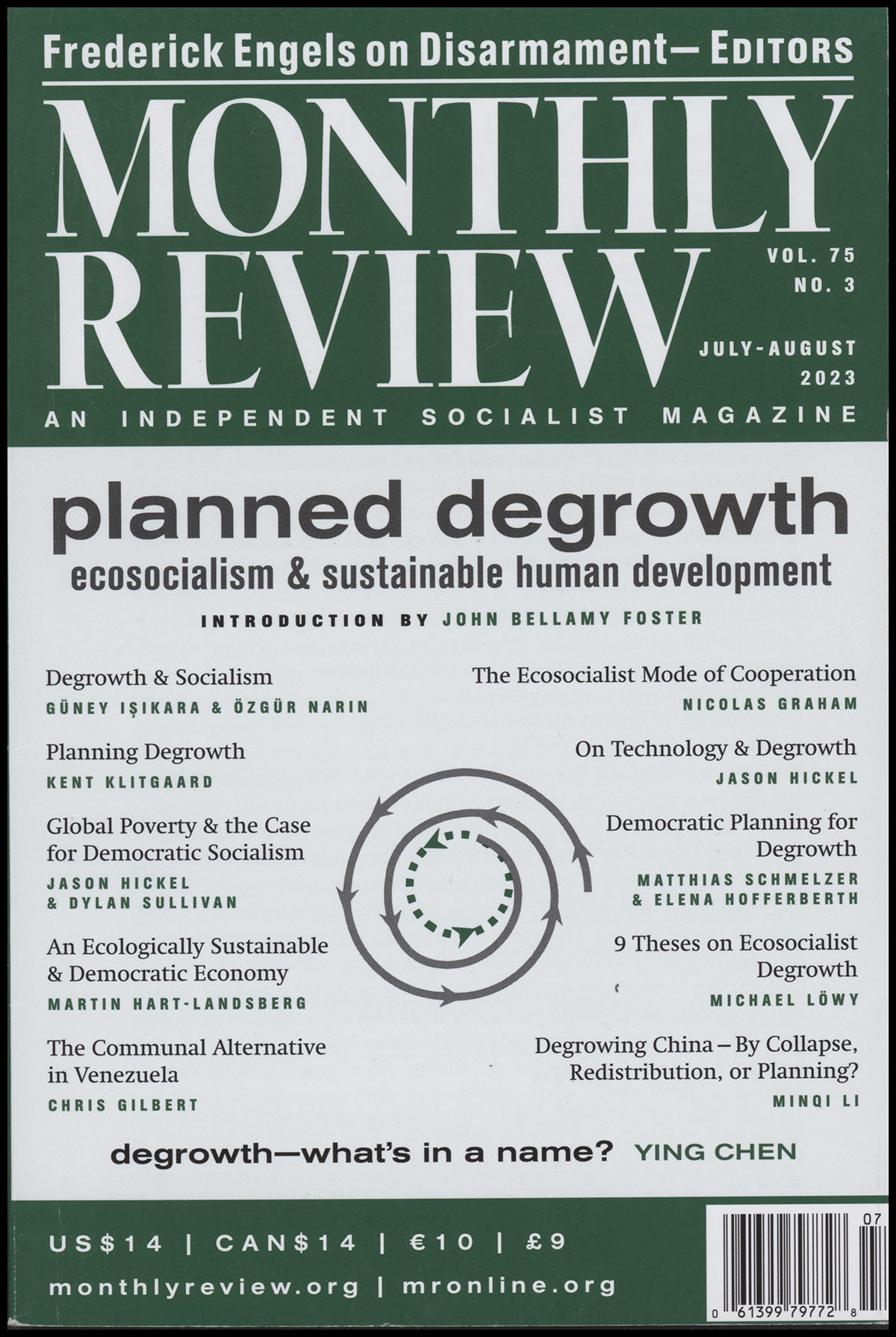
The specter of degrowth and even ecological civilization, championed by certain Western circles, looms large. These policies are the newer, kinder versions of the One Child Policy; “friendly suggestions” eagerly being pushed upon a sovereign nation by the Sinophile left and by environmentalists. Are they truly the best policies for China, or are they being forced upon the country to be allowed to develop?
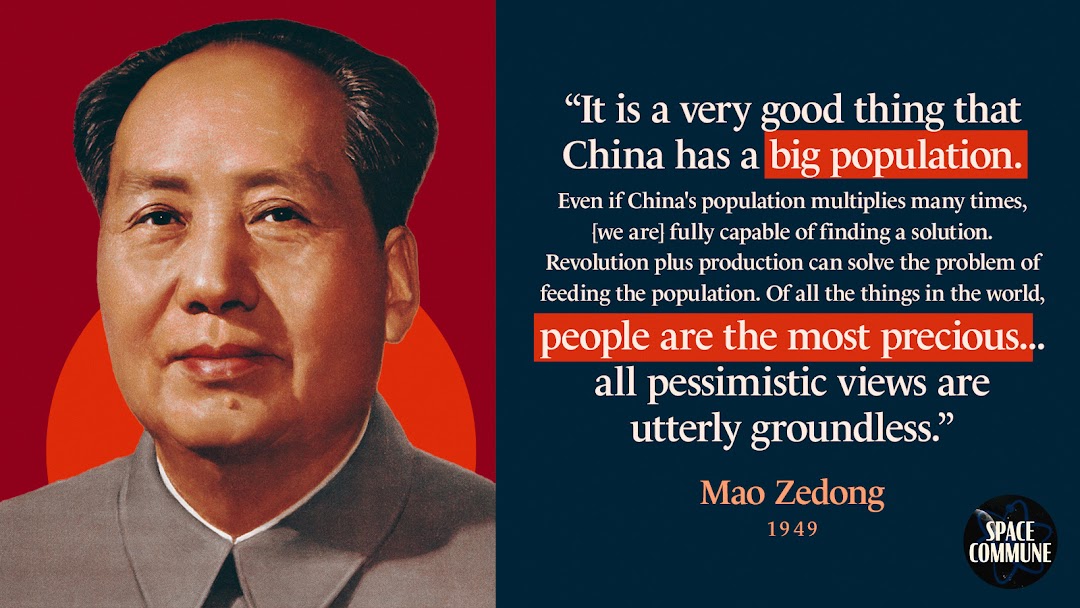




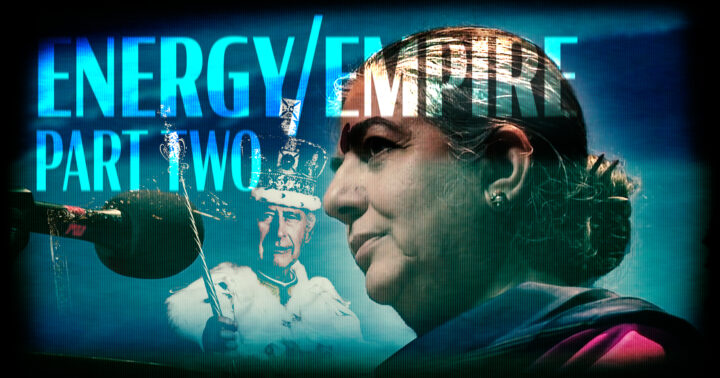
Excellent work. I’d like to add another piece to this puzzle.
After Deng Xiaoping took over the government of China in the late seventies one of the first things that he did was to sent Chinese scientists to every part of the western world, in order for China to catch up with the rest of the world. One of those scientists ended up in my neck of the woods at the academic doorsteps of what is now the University of Twente.
Everybody was quite surprised to see this Chinese visitor and as neither could speak each others language the communication was problematic. A graduate student was given the task to host the unexpected guest as nobody really knew what to do with him.
That graduate student happened to be working on a rather basic computer model of population growth and he showed his Chinese guest what the predictions were for China. Unbeknownst to him in doing so he scared the living daylight of his guest who took this worst case scenario from the University of Twente back to China with a sense of urgency. That flawed model quickly made its way up the Chinese bureaucracy.
So this change encounter and severe miscommunication became one of the main drivers for China to impose the draconian one-child -policy.
A few years ago the two protagonist met again in the Netherlands and briefly discussed their fateful encounter in my local media. They pretty much acknowledged that they were wrong all those years ago.
Very interesting. I think they’ve gotten a lot better at sifting through and finding the best of everything. I’d like for them, and humanity, to decide what’s best free of imperialist influence!
Certainly bad ideas from idiots (but highly qualified ones at a university!) with computers… but also this implementation could only happen in a totalitarian regime where policy criticism is death.
Starvation was a true problem for China at the time though as their ridiculous Lysenkoist style policies about food production were causing famines. So unfortunately the backdrop and conditions for alarm were understandable if not tragic.
+1 for Julian Simon. That guy was the boss!
Contemporary Chinese scientists acknowledge the contributions Lysenko made to science… I think the issue was more a lack of development and access to meaningful outside capital. Instituting population control policies was the quickest way to unlock the capital. With modern advancements they have a food surplus and use their arable land very productively.
I wasn’t trying to say that they were using the Lysenko methods, but Mao had many of his own crazy ideas like killing all the sparrows that didn’t go so well… To your point they were very closed off to the world before the 70s, so they didn’t get the modern agriculture benefits until much later and their development was very slow as a result.
Even today, China is a MASSIVE food importer and to my knowledge they are basically not able to grow enough for themselves on the land they have. A lot of that is just the geography that they were endowed with and the huge amount of industrial inputs that farming there requires (which makes it a lot more expensive). So some is probably just economic effects of getting richer, but it is hard to recover from an import dependency like that in a short timeframe which adds to their feelings of insecurity.
I would go further: the Bilderberg Group (Luciferians) did much more than pressure China to limit population growth. The U.S. government possessed and deployed weather modification to starve millions of Chinese.
Wilhelm Reich re-purposed Tesla’s free-energy device and Brookhaven Labs released thousands of “radiosondes.” Purportedly, these weather balloons were simply transmittling data; however, Preston Nichols was unable to locate a single receiver on the ground. (https://inscribedonthebelievingmind.blog/2022/04/16/montauk-project-experiments-in-time/)
Furthermore, George H.W. Bush, the leader of Project Omega, was stationed in China from Oct. 1974 to Nov. 1975. This was around the time that Mao Zedong began to accuse Deng Xiaoping of being a “capitalist-roader.” Following Mao’s death, Deng became the maximum leader of the PRC, in December 1978. Under his leadership, the Communist Party of China was transformed into a subsidiary of the global capitalist class, and China became a capitalist state.
From studying Bush’s expertise in MK-Ultra programming of children, and the supernatural control he had over every head of state in the world since Kennedy’s assassination, it’s pretty clear that Deng was also mind-controlled by the Bilderbergers (the Luciferian Brotherhood).
(https://inscribedonthebelievingmind.blog/2022/08/04/the-great-replacement/)
Thanks for the links Diana, I’ll check them out!
The Wine Well:
The temple named after Lady Wang is in a nook of the Ho-Fu Hills, which stand some ten miles to the west of my own county. When she lived is no longer known, but the elders passed down the following story.
The old woman made her living brewing wine. Once when a Taoist priest stayed at her home, she served him freely—giving him as much to drink as he asked for. Eventually he drank several hundred jars without paying, but the woman never mentioned it.
Then one day the priest said to the woman, “I have been drinking your wine without having the money to pay you, but allow me, if you will, to dig a well for you.” He set to and constructed the well, and a stream of the purist wine gushed forth. “This is to repay you,” said the priest. And he went his way.
After Lady Wang no longer brewed her wine; she simply took what flowed from the well to satisfy her customers. And since it was far finer than her previous brews, customers came in droves. Within three years she earned tens of thousands of coppers, and her household became wealthy.
Unexpectedly the Taoist priest returned. The old woman thanked him profoundly. “Was the wine satisfactory?”asked the priest. “Good enough.” replied the woman, “but it left me no dregs to feed my pigs.” The priest smiled and wrote these lines on the wall:
The heavens may be great,
But the greater is man’s greed.
He made the well, she sold the wine,
But said, “No dregs for feed.”
Then he left, and the Well ran dry…
—Chiang Ying-k’e.
Very cool, thank you for sharing that!
Aloha AD, thanks for your comment.
It is Chow Fun Time… laters…
Gold, Gold…
Many, many years ago there was a man of the Land of Ch’i who had a great passion for Gold. One day at the crack of dawn he went to the market—straight to the gold dealer’s stalls, where he snatched some Gold and ran….The market guards soon caught him. “With so many people around, how did you expect to get away with it?” a guard asked.
“When I took it, he replied, “I saw only the Gold, not the people.”
—Lieh Tzu.